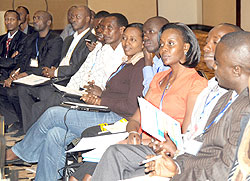Journalists should observe the social responsibility expected of them by the public if they are to fully utilise the media freedoms they often advocate for. This was one of the key recommendations arrived at during the just-concluded media dialogue that brought together local and international media practitioners and experts to discuss ways of revamping the local media industry.


Journalists should observe the social responsibility expected of them by the public if they are to fully utilise the media freedoms they often advocate for.
This was one of the key recommendations arrived at during the just-concluded media dialogue that brought together local and international media practitioners and experts to discuss ways of revamping the local media industry.
Shyaka Kanuma, the proprietor of a local weekly newspaper, Rwanda Focus, explained that when misused, as is sometimes the case, media freedom brings about regrettable outcomes.
"Rwanda has a story to tell on this issue. Some journalists misused this freedom by instigating the murder of specific people, through their broadcasts,” said Kanuma.
"However, some out there still insist that such journalists were exercising their media freedom,” he added.
He admitted that striking a balance between total media freedom and social responsibility remains a challenge, especially because of selfishness by some media outlets to maximise sales.
The Executive Secretary of Media High Council, Patrice Mulama, noted that even in incidences where journalists are involved in criminal acts and are appropriately penalised by law enforcers, their cases are misinterpreted as attack on media freedom.
The head of the African Commission of Human and People’s Rights, Zainabu Kayitesi, also recommended ample media freedom for Rwanda, disclosing that her organisation had conducted a series of consultations in African countries, pertaining to this particular right.
The two-day dialogue, revisted a number of issues, including media self-regulation, and need to decriminalise defamation.
Ends


